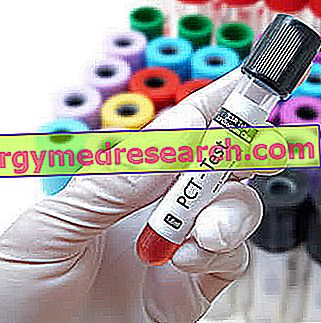Generality
Procalcitonin (PCT) is a biological marker of sepsis and septic shock, and of severe inflammatory reactions. At the plasma level, the finding of elevated PCT values is strongly suggestive of a phlogistic response to a systemic bacterial infection.

What's this
Procalcitonin is the precursor of calcitonin. However, these two compounds have very distinct characteristics between them. Calcitonin is secreted exclusively by the C cells of the thyroid, following certain hormonal stresses; PCT can be produced by different types of cellular components and by many organs in response to pro-inflammatory stimuli (eg bacterial endotoxins and cytokines).
The precise biological role of procalcitonin remains largely unknown, but it has recently been hypothesized that it could take part in the pathogenesis of sepsis.
Why do you measure
Plasma procalcitonin is measured as an early sepsis test. For this condition, the PCT presents a high degree of diagnostic accuracy and allows to anticipate the therapeutic intervention. The examination is particularly useful when it is necessary to distinguish bacterial infections from those with other aetiology or from non-specific inflammation.
Moreover, PCT allows the monitoring of septic patients treated with antibiotics, establishing the resolution of the pathological process or the risk of progression from severe sepsis (associated with organ dysfunction) to septic shock (sepsis with hypotension and perfusion alterations) .
In addition to supporting the diagnosis of sepsis, procalcitonin has also proved useful in monitoring the course and severity of the systemic inflammatory response.
Sometimes, the PCT dosage can be prescribed in patients with:
- Tissue damage due to trauma or surgery;
- Viral diseases such as pneumonia, in order to detect early development of secondary bacterial infections.
The determination of procalcitonin can be requested together with other laboratory investigations, such as haemoculture, blood count with leukocyte formula, CSF analysis and measurement of C-reactive protein (PCR).
Normal values
Normally, procalcitonin plasma concentrations are less than 0.05 ng / ml .
In patients with sepsis or septic shock, however, these values may increase up to 1, 000 ng / ml; procalcitonin reflects the severity of the disease and the course of inflammatory activity.
Usually, procalcitonin levels:
- Above 0.5 ng / ml they are interpreted as abnormal values, suggestive of a septic syndrome.
- Including between 0.5 and 2 ng / ml represent an interval of uncertainty regarding the diagnosis of sepsis; in these cases, it is recommended to repeat the dosage after 6-24 hours, until the specific diagnosis is identified.
- Above 2 ng / ml they are strongly suggestive of an inflammatory process with systemic involvement.
- Above 10 ng / ml they are found almost exclusively in patients with severe sepsis or septic shock.
High Procalcitonin - Causes
- Plasma procalcitonin levels increase rapidly (within 6-12 hours) following an infective insult with systemic consequences. PCT is significantly elevated especially in the early days of severe sepsis, septic shock and multiple organ dysfunction syndrome.
- In patients with systemic inflammatory response syndrome (SIRS) not of bacterial origin, procalcitonin concentrations are usually lower than 1 ng / ml. The values remain <0.5 ng / ml even in the presence of viral or localized infections, allergies and autoimmune diseases.
- Regardless of the presence of an infectious process, PCT levels can be elevated even immediately after a multiple trauma or surgery, in severe burns or in newborns (with less than 48 hours of life). In these cases, however, the return to basic values is rapid; a possible second increase of procalcitonin could indicate the development of a septic episode.
- Procalcitonin may also be elevated in patients with severe or prolonged cardiogenic shock, changes in severe organ perfusion, small cell lung cancer, or medullary thyroid carcinoma (C cells).
Low Procalcitonin - Causes
Low levels of procalcitonin are not usually associated with medical problems and / or pathological consequences, therefore they are not considered clinically relevant.
How to measure it
The procalcitonin test is performed on a blood sample taken from the vein of an arm.
Preparation
Before the procalcitonin test it is necessary to observe a fast of at least 8 hours, during which a small quantity of water is allowed.
Interpretation of Results
- Daily changes in procalcitonin levels give indications on the course of the disease and the patient's prognosis with sepsis. For this reason, the dosage of this parameter is indicated for early and reliable diagnosis in all patients suspected of having sepsis or a systemic inflammatory response.
- A high value of procalcitonin should prompt you to start antibiotic therapy as soon as possible.
- Persistently high levels of PCT are associated with poor prognosis and are interpreted as therapy failure or failure to eliminate the source of infection.
- If the procalcitonin plasma levels are lower than 0.5 ng / ml, instead, the presence of a bacterial sepsis is unlikely.



